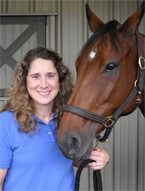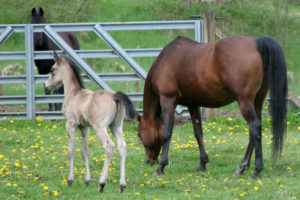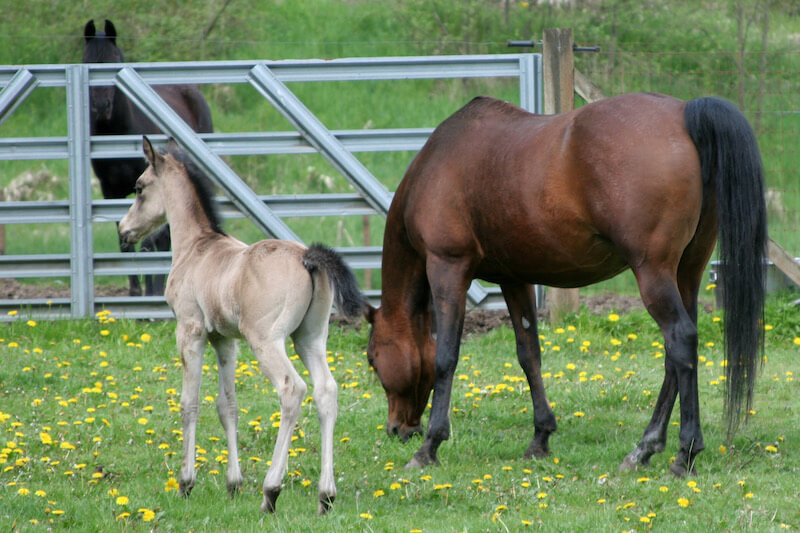Breeding Considerations in the Older Mare
by Brandi Holohan, DVM, Pilchuck Veterinary Hospital

Breeding horses has changed significantly from what it has been in the past. Previously, broodmares were maintained for bloodlines or for performance ability and performance mares would be retired from show and then begin the broodmare career. Because of the current economy, the broodmare herd has to be limited due to the financial investment. One has to be much more selective in choosing which mares are utilized. The other breeding population that comes into play are those mares that have sentimental value or superior personality, and the owner wants a baby for more than a sales reason.
Decisions on breeding and investing in a pregnancy can be made from many perspectives. The largest variable to consider is strictly financial. Is the mare an easy breeder? Is her breeding soundness above average? If the mare gets pregnant on the first breeding and stays pregnant, veterinary costs are minimized. If the pregnancy requires more financial input to achieve, is the value of the foal high enough to offset the cost? This question becomes important with some performance mares that don’t enter the broodmare situation until past ideal reproductive age, and further therapies may need to be instituted to achieve and maintain a pregnancy. More often these days, a mare is presented for breeding because the owner wants her offspring for sentimental reasons, and the acceptable expense may be higher than in a production or sales situation.

Issues common to mares being bred later in life are many and include pre-existing uterine infections that need to be treated before breeding attempts can begin. Some mares have endometrial cysts that may interfere with the attachment of an early pregnancy; these cysts can be removed if they are large. Common uterine issues also include the ability to clear inflammatory fluid post-breeding. This may require repeated uterine lavage and hormonal treatments which can be costly. Some mares that have issues may still be able to produce offspring by utilizing advanced reproductive methods including embryo and oocyte (an egg before maturation) transfer and low dose semen infusion techniques.
It is important to have a breeding soundness exam performed to identify good broodmare prospects. Among other factors, your veterinarian will check to see if the mare is in good body condition and free of orthopedic issues to allow her to carry the pregnancy comfortably and successfully; if her reproductive tract in good condition; if she has good anatomical structure to prevent contamination of her uterus with urine or manure; and if her uterus is free of any condition that would lower her fertility or prevent her from being able to carry a pregnancy to term.
To identify any issues, your veterinarian will perform physical, soundness, rectal and speculum exams to visualize vaginal structures. A trans-rectal ultrasound along with uterine culture and cytology, uterine biopsy and hysteroscopy can be used to identify internal issues. Routine blood work may also be run to identify any other systemic conditions that may affect reproductive performance. Diagnostic testing does come with an investment, but more substantial financial loss can come about later when dealing with problems encountered after the breeding investment has been made.
The breeding method also must be taken under consideration. While a live breeding may be the least expensive, it may also prove to be the riskiest to the mare and stallion. Utilizing shipped/cooled semen can be a safer option, but may prove problematic if the mare has uterine fluid accumulation issues. Frozen semen may be an easier route if the stallion is out of country or has a busy show schedule, but may not provide the pregnancy rates or meet budget restrictions on veterinary care.
Trying to find the right balance between desire for a foal from a specific mare and making the most financially sound investment can be difficult. Consulting your veterinarian or reproductive specialist is an important step in making decisions about pursuing a reproductive endeavor for a mare. He or she can help to provide the information needed to create an appropriate plan to meet your budget and/or breeding goals.
Dr. Brandi Holohan is an equine veterinarian at Pilchuck Veterinary Hospital. She received her DVM from the University of Wisconsin, College of Veterinary Medicine in 2000, and joined Pilchuck in 2001 after completing a one year internship there. Special interests include equine reproduction and dentistry. For appointments and 24/7 emergency, call 360.568.3111. Online at pilchuckvet.com.
Published January 2014 Issue

The Northwest Horse Source is an independently owned and operated print and online magazine for horse owners and enthusiasts of all breeds and disciplines in the Pacific Northwest. Our contemporary editorial columns are predominantly written by experts in the region, covering the care, training, keeping and enjoyment of horses, with an eye to the specific concerns in our region.








